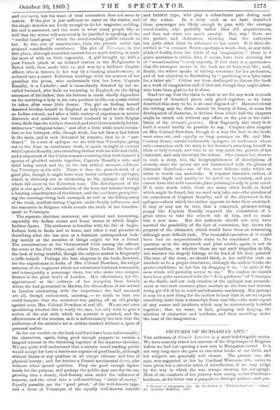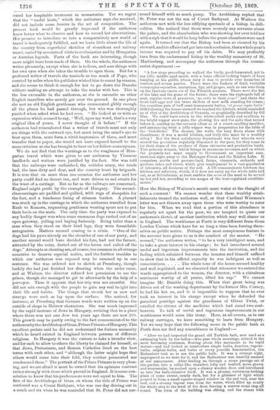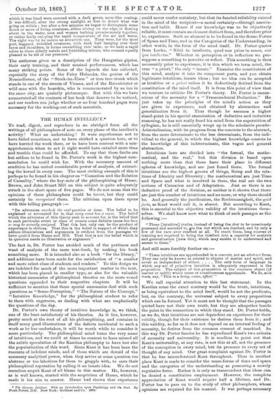PICTURES OF HUNGARIAN LIFE."
THE authoress of Flemish Interiors is a most indefatigable writer. We have scarcely closed her account of the B6guinages of Belgium before we find her opening a new vein in Hungarian travel. It is not very long since she gave us two other books at one birth, and her subjects are generally well chosen. The present one, she says, was suggested to her by Cardinal Wiseman, who seems to have given her a circular letter of introduction, if we may judge by the way in which she was always showing his autograph. Most of the comforts of her journey were owing to the Cardinal's kindness, as his letter was a passport to Bishops' palaces, and pro- • Pictures of Ilungarian Life. By the Author of "Flemish Interiors," "oneel,' de. London: Ridgway. 1b69.
that the "useful hints," which the authoress says she received, did not include some lessons in the art of composition. The present book would be greatly improved if the authoress knew better what to observe and how to record her observations. Her promise to introduce us into a comparatively new world of travel is inadequately fulfilled, and we learn little about the life of the country from superficial sketches of steamboat and railway travel, varied by accounts of visits to ecclesiastics and by Hungarian or Austrian legends. Parts of the book are interesting, though more might have been made of them. On the whole, the authoress writes pleasantly, except when she is tedious, and sees things with her own eyes when she takes the trouble to open them. But for a professed writer of travels she reminds us too much of Pope, who counted by miles when his publisher wished him to count by stanzas, and she seems to think it enough for her to go down the Danube without making an attempt to take the reader with her. This is the less excusable in the authoress, as she is sarcastic on other English travellers who merely get over the ground. In one place she met an old English gentleman who enumerated glibly enough all the places he had passed through, but who was thoroughly puzzled when asked what he had seen. " He looked at us with an expression which seemed to say, ' Well, upon my word, that's a very original idea of yours. I never thought of it before.' " If the authoress bad remembered that a writer of travels must not only see things with the outward eye, but must bring the mind's eye to bear upon them, must form a vivid impression of them, and must transfer that to paper, she would not have exposed herself to the same criticism as she has brought to bear on her fellow-countryman.
We do not find that the warnings as to the roughness of Hun- garian travel which were given to our authoress by Viennese landlords and waiters were justified by the fact. She was told that the railways were unfinished, the vehicles crazy, the roads bad, the inns dirty and dear, and the country beset by brigands. It is true that on more than one occasion the authoress and her party could find no decent inn, and were driven to sad straits for the want of a carriage. But as far as the railways are concerned, England might profit by the example of Hungary. The second- class carriages are padded and quilted, with rugs of sheepskin for the feet, and a handsome lining of crimson leather. A placard was stuck up in the carriage in which the authoress travelled from Raab to Komorn, requesting gentlemen wearing spurs not to put their heels on the seats. The only time the party was exposed to any bodily danger was when some enormous dogs rushed out of an open gateway, yelling and baying furiously. Being taller than a man when they stood on their hind legs, they were formidable antagonists. Matters seemed coming to a crisis. " One of the dogs had his paws already on the shoulder of one of our party, and another second would have decided his fate, had not the farmer, attracted by the noise, darted out of the house and called off the dogs." Attempts at cheating are, of course, too common in all strange countries to deserve especial notice, and the further troubles to which our authoress was exposed may be summed up in one sentence. She was ordered not to sketch at Pressburg, though luckily she had just finished her drawing when the order came, and at Waitzen the director refused her permission to see the prison, though she managed to get in afterwards by the help of a purveyor. Thus it appears that her trip was not eventful. She did not mix enough with the people to gain any real insight into their life and habits. The things that struck her as new and strange were such as lay upon the surface. She noticed, for instance, at Pressburg that German words were written up on the outside of shops in Hebrew characters. She was much impressed by the rapid increase of Jews in Hungary, noticing that in a place where there was not one Jew ten years ago there are now 200. This growth may be partly owing to the fact communicated to the authoressby the Archbishop of Gran, Prince Primate of Hungary. This excellent prelate said he did not understand the furious animosity which he beard existed in England between persons of different religions. In Hungary it was the custom to take a broader view, and for each to allow to others the liberty he claimed for himself, so that Jews, Protestants, and Roman Catholics lived on the best terms with each other, and "although the latter might hope that others would come into their fold, they neither persecuted nor condemned them." The portrait of the Prince Primate is very pleas- ing, and we are afraid it must be owned that his opinions contrast rather strongly with those which prevail in England. It is some con- solation to know that his predecessors were not equal to him. The first of the Archbishops of Gran on whom the title of Prince was conferred was a Count Bathyani, who was one day driving out in a coach and six when he was reminded that St. Peter did not sur-
cured her hospitable treatment in monasteries. Yet we regret round himself with so much pomp. The Archbishop replied that
St. Peter was not the son of Count Bathyani. At Waitzen the authoress met with the less edifying spectacle of a bishop iu diffi culties. She noticed. that there were scarcely any servants about the palace, and the chamberlain who was showing her over told her with a sigh that it would be long before the guest-chambers were used again. It turned out that the Bishop had been so cheated by his steward, and his affairs had got into such confusion, theta whole year's income was required to pay off his debts. We may profitably turn from the embarrassed bishop to the wealthy monastery of St. Martiusberg, and accompany the authoress through the commi- sariat department :— " A few steps preceding us walked the burly, good-humoured, not to say jolly, middle-aged monk, with a large official-looking bunch of keys hanging at his girdle, whose duty it was to preside over haunches of venison and cream pasties. There were the baskets of fruit, veritable cornucopim—peaches, nectarines, figs, and grapes, such as one sees them on the luscious canva-ses of the Flemish masters. There were the fish of the lake and the game of the forest ; there were the cupboards full of neat, regular rows of preserves, 'no sates to their jams!' and there the fresh-laid eggs and the brass skillets of new milk standing for cream ; the countless pats of buff semi-transparent butter, 'et pressi copia Still following the house-steward we reached the kitchen, which reminded us of that of the Archbishop of Granada, so graphically described by Gil Blas. We could have sworn to the white-robed cooks and scullions, to the bright copper stew-pans, the glowing fire and the spits that turned before it, sending up the savoury odour as of a sweet-smelling sacrifice, and announcing what a jolly supper was in preparation for the table of the Geistliche.' The dresser, the walls, the very floors shone with cleanliness: it was a model kitchen, and truly this must be a wealthy abbey ! Not the least satisfactory department was that wherein were stowed the provisions regularly dispensed to the poor, for they come in for their share of the produce of those extensive and productive lands. This princely domain, which brings in enormous revenues, and on which the property-tax must supply to Government an important sum, stretches right away to the Bakonyer Forest and the Balaton Lake. It comprises arable and pasture-land, farms, vineyards, orchards and gardens, lakes and rivers, which give employment to a vast population of labourers, all denizens of the soil. A lift communicates between the kitchen and refectory, which, if it does not carry up the whole table laid out, as at Schonbrunn, at least enables the menu of the meal to be served up hot and hot, according to the usages of the best-regulated establish- ments."
How the Bishop of Waitzen's mouth must water at the thought of such a contrast ! We cannot wonder that these wealthy estab- lishments treated the authoress well, or that Cardinal Wiseman's letter was not thrown away upon those who were worthy to cater for him. When we read that a portion of this abundance is regularly set apart for the poor, we are tempted to quote our authoress's sketch of another institution which may well shame us in England. The workhouse at Pesth is very different from those London Unions which have for so long a time been forcing them- selves on public notice. Perhaps the most conspicuous feature in the account here given to us is the conduct of the master. "He seemed," the authoress writes, " to be a very intelligent man, and to take a great interest in his charge ; he had introduced several useful and ingenious improvements into the institution, and the feeling which subsisted between the inmates and himself sufficed to show that in his official capacity he was indulgent as well as conscientious The whole tone of the house seemed healthy and well regulated, and we observed that whenever we entered the wards appropriated to the women, the director, with a chivalrous sentiment worthy of all praise, lifted his cap." We cannot imagine Mr. Bumble doing this. When that great being was driven out of the washing department by the former Mrs. Corney, he had his hat on, and it is impossible to suppose that he ever took an interest in his charge except when he defended the parochial porridge against the greediness of Oliver Twist, or extolled the virtues of the medicine which had cured two coal- heavers. To talk of useful and ingenious improvements in our workhouses would seem like irony. Here, at all events, as in our railway carriages, we have something to learn from Hungary. Yet we may hope that the following scene in the public bath at Pesth does not find any resemblance in England :—
" After we had inspected the grand old Turkish bath, now used as a swimming bath by the ladies—who pass whole mornings, attired in the moat becoming costumes, floating about like mermaids in its tepid waters—and bad looked at numberless single baths, douches, vapour- baths, sulphur-baths, and baths of every possible denomination, the Badmeister took us to see the public bath. It was a strange sight, unprepared as we were for it, and the Badmeister was heartily amused at our amazement. After leading us, through a stone passage out of the garden, into a cellar-like chamber, lofty and vaulted, moss-grown and crepuscular, be pushed open a clumsy wooden door, and introduced us into the bath-chamber itself. It was a gloomy, cavernous-looking place of some extent, nearly dark, but for a glimmer of light which poured in from a small square-shaped window in the end wall, near the roof, and a steamy vapour rose from the water, which filled np nearly the whole area to the level of the door, leaving a narrow stone step all round. The form of the building was oblong, and the stones with
which it was lined were covered with a dark green, moss-like coating. It was difficult, after the strong sunlight, at first to detect what was going on within ; but after a few minutes we began to distinguish some dozen or more of living creatures, either sitting on the edge or floating about in the water, men and women bathing promiscuously together, or rather lazily enjoying the tepid temperature of the air and water. The sight was by no means an attractive one. They were, for the moat part, haggard, wrinkled creatures, with dank hair hanging over their faces and shoulders, in forms resembling rats' tails ; so we bade a rapid adieu to these elderly naiads and forbidding tritons, who seemed equally pleased to be rid of our presence."
The authoress gives us a description of the Hungarian gipsies, their early training, and their musical performances, which has many striking points. Some of the legends she has collected, especially the story of the Fairy Hulatnka, the genius of the Neusiedlersee, of the " Stock-im-Eisen " or iron tree-trunk which stands in one of the streets of Vienna, and of the BarenUuter or wild man with the bearskin, who is commemorated by an inn in the same city, are quaintly picturesque. But with this we have enumerated all the contents of her book that deserve to be noticed, and our readers can judge whether or no four hundred pages were necessary for the working-out of such materials.
































 Previous page
Previous page